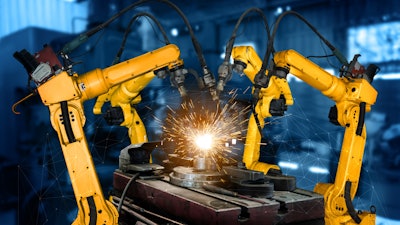
Volatility in the estimates of Artificial Intelligence in the manufacturing market – $5 billion or $10 billion or $16 billion between 2025 and 2027– matches the volatility in the manufacturing industry when Covid-19 dislocated supply chains and disrupted logistics networks, worldwide.
But all point to a sharp increase in AI adoption as manufacturers digitize rapidly to adapt to a post-pandemic reality. According to the Infosys Digital Radar 2020 report, manufacturing is among the industries recording the biggest improvement in digital maturity over the previous year.
Another separate survey of more than 1,100 senior manufacturing executives worldwide conducted in October – November 2020 found that nearly two-thirds of manufacturers were leveraging AI in their daily operations, while one-fourth were spending at least half of their total IT budget on it.
While there are unlimited possibilities for AI in manufacturing, most companies are prioritizing use cases that resolve their pain points in the areas of quality assurance, risk mitigation and inventory/supply chain management.
AI, from assuring quality to averting catastrophe
Unlimited data and the availability of affordable computing and storage for processing it are the wind beneath AI’s wings. The beauty of artificial intelligence technologies is that they are capable of understanding unstructured information – video, sound, photographs, gestures – which makes up an estimated 90% of an enterprise’s data.
Unstructured data is a rich vein of insight, which unfortunately goes virtually unutilized, as enterprises stick to the information ordered neatly within their internal databases.
But that is slowly changing as manufacturers realize that AI, applied on unstructured data, can yield unprecedented visibility into unknown unknowns to deliver real value.
Some of the most compelling use cases are in quality assurance where AI can proactively identify issues to avert a crisis later on: take product recall, for example.
Most incidents trace back to flaws in design or manufacturing, stemming from a combination of human, machine and process factors. AI-based pattern matching solutions can monitor video feeds and operational parameters to detect abnormalities early, well before they cascade into a serious problem.
Unsurprisingly, the automobile industry could be one of the biggest beneficiaries – Ford uses image recognition to spot wrinkles in its seats.
Recently, General Motors recalled its Chevrolet Bolt EV when it detected a supplier manufacturing defect linked to a fire risk; the company could potentially have averted this problem by proactively using AI in manufacturing.
AI, monitoring the shop floor to mitigate risk
AI can monitor sensor data and flag off anomalies that could lead to equipment failure or downtime. Machine learning and predictive analytics tools can perform what-if analyses on equipment data, including vibration, temperature and speed to simulate various scenarios in case of change in any of those parameters and raise an alarm if required.
Singapore Port Authority, for example, uses AI to create a digital twin of its container shipment hub and with that, simulates multiple scenarios to decide the optimal location for a vessel based on its manpower, space and asset requirements.
AI, for managing inventory amid supply crises
The chip shortage issue has forced automotive companies to change the way they manage inventory. Instead of ordering chips just-in-time, vehicle manufacturers are planning their stocks in advance.
Proven to be more accurate than traditional methods at forecasting demand and planning supply, AI can play a valuable role here, listening in to various inputs to take inventory decisions autonomously, in real-time.
Depending on the demand at any given time and the stock on hand, the solution can calculate the safety stock, replenishment levels and order quantity.
Stung by the chip crisis, some automotive manufacturers are shifting to a make-to-order business model, producing vehicles only against confirmed orders.
Ford is asking its customers to order vehicles online instead of picking a vehicle from dealer inventory; there is a case here for using AI to decide the final configuration based on the choice of features and availability of chips and parts, to maximize the profit on each sale.
In the ecommerce business, Amazon uses AI to estimate demand and stock items in warehouses as close to the customer as possible.
AI, for managing complex supply chains
With global linkages, widespread product portfolios, and now, Covid-fueled disruption, supply chains are a thing of complexity.
As manufacturers also grapple with shifting regional alignments and environmental regulations, they need agility and flexibility in managing their supply chains.
AI-based supply chain solutions can help the manufacturing industry meet these challenges by making sense of huge volumes of data, providing end-to-end visibility, and enabling enterprises to take better, faster and autonomous decisions.
The manufacturing sector is no stranger to upheaval, but the disruption caused by the pandemic may be its biggest challenge yet.
The good news is that the industry has embraced digital technologies, including artificial intelligence, to overcome its problems and focus on sustainable ways of functioning.
Manufacturers are also adopting new trends like Tiny AI that help them automate manufacturing processes in sustainable ways.
While the list of use cases is virtually endless, most companies are deploying AI to control quality, mitigate risk and also to meet supply chain uncertainties head-on.
---
Vijay Narayan has over 25 years of experience in strategizing and delivering technology enabled, business performance improvements for Fortune 1000 Enterprises. He is Senior Vice President and Industry Head of Manufacturing at Infosys where he is responsible for managing sales and delivery professionals as well as developing and executing strategic roadmaps for Infosys’s manufacturing sector.























